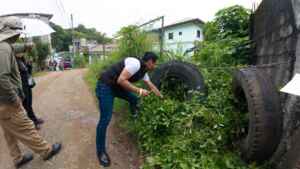BAGUIO COUNCIL TO CONGRESS: ‘AMEND ANTI-TERRORISM LAW’
The Baguio City Council has called on Congress to revisit and amend the Anti-Terrorism Act of 2020 or Republic Act No. 11479 to ensure that the law addresses real threats and is not used to suppress activism. The call was prompted by a report from United Nations Special Rapporteur Irene Khan who looked into the state of freedom of expression in the Philippines.
Khan visited the country in early 2024 and held dialogues with government officials, journalists, and civil society organizations in various cities including Baguio. In her report
delivered on June 18, 2025 before the 59th UN Human Rights Council Session, Khan raised red flags over practices like red-tagging and legal intimidation and recommended several institutional reforms such as the abolition of the National Task Force to End Local Communist Armed Conflict (NTF-ELCAC) and a review of RA 11479.
On June 23, 2025, the city council approved a resolution authored by Councilor Jose Molintas endorsing Khan’s findings and pushing for changes to the Anti-Terrorism Act. The resolution urges Congress to amend provisions of the law that can be abused. Critics argue that the law uses broad and ambiguous terms that are too broad and vague which could potentially criminalize peaceful protests and dissent. One contentious provision is Section 25 which grants the Anti-Terrorism Council (ATC) the power to label individuals or groups as terrorists based on probable cause. Once designated, their assets can be frozen by the Anti-Money Laundering Council (AMLC) without needing a court order. Another one is Section 29 which permits the detention of suspected terrorists for up to 24 days without judicial warrant or charge. Critics say this provision undermines constitutional protections against arbitrary detention and violates the writ of habeas corpus.
Molintas asserted that certain provisions of the law present serious threats to free speech, journalism, and peaceful protest, thus the need for amendment. The city council also calls on the Department of Justice (DOJ) to review all cases filed under RA 11479, especially those involving activists and human rights defenders, and to drop these charges if warranted. The Anti-Terrorism Act of 2020 was principally authored by Senator Panfilo Lacson and co-authored by Senator Vicente Sotto III, Imee Marcos, Ronald “Bato” dela Rosa, Bong Revilla Jr., Francis Tolentino, and Manuel “Lito” Lapid. It was sponsored in the House by Representatives Narciso Bravo Jr. and Jericho Nograles. The measure was signed into law by President Rodrigo Duterte on July 3, 2020 and became effective on July 18, 2020, replacing the Human Security Act of 2007 (RA No. 9372). It became effective on July 18, 2020. The law has sparked resistance across the country. Various sectors such as activists, artists, lawyers, faith-based groups, and ordinary citizens have strongly opposed it, saying it could be used to threaten critics and humanitarian workers. People have held protests, filed court petitions, and spoken out against its “vague and abusive” provisions.
SP/Jordan G. Habbiling
Metro BLISTT
PAGLILINIS SA OVERPASS
July 5, 2025
DENGUE SURVEILLANCE
July 5, 2025
MAYOR APPEALS ANEW FOR RESPONSIBLE WASTE DISPOSAL
July 5, 2025





